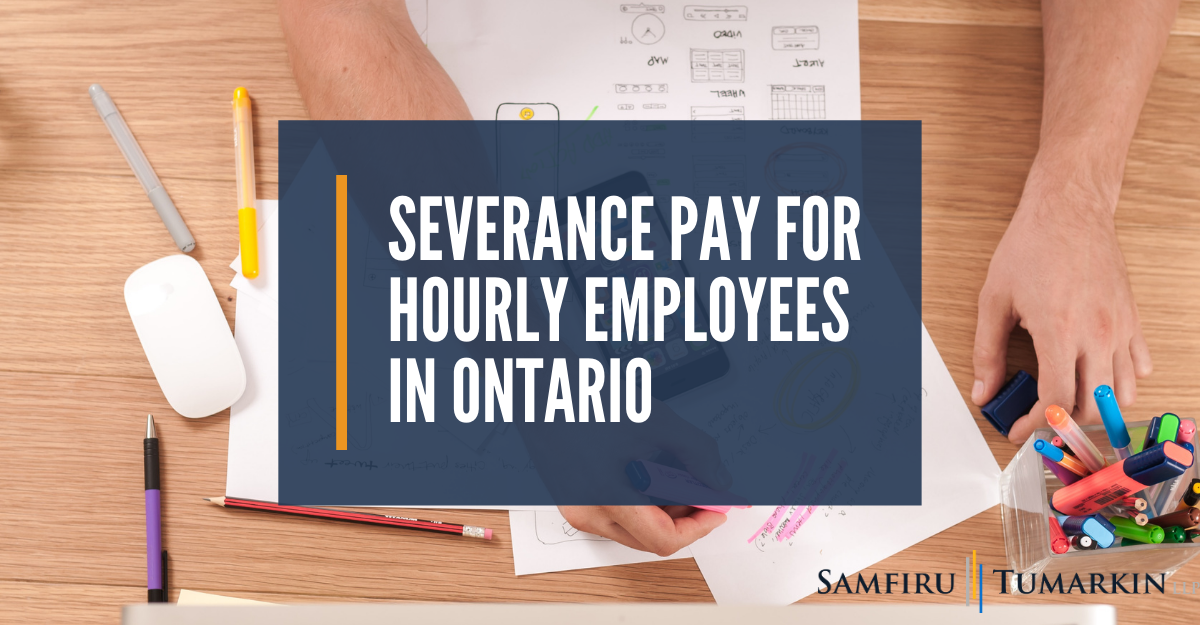Severance for Hourly Employees in Ontario

Am I entitled to severance as an hourly employee in Ontario?
Non-unionized hourly employees in Ontario get full severance pay, just like salaried workers. Severance is owed if they are fired without cause. The amount varies depending on the situation and specific factors relating to the employee and his or her employment.
Regardless of your pay structure, you are absolutely entitled to Ontario severance pay if terminated without cause.
How is severance for an hourly employee calculated?
There are two “types” of severance pay an hourly employee may be entitled to when terminated without cause:
- Statutory severance pay determined by the Ontario Employment Standards Act (ESA)
- Reasonable notice at common law
What is statutory severance pay?
The Ontario ESA sets out the minimum amount an employer must pay any employee on termination. Your statutory entitlements are comprised of statutory notice, pay in lieu of notice and/or statutory severance pay (collectively referred to as severance pay or termination pay).
The specific amount you must be paid is determined by the your length of service and the size of your employer’s payroll and must be paid on the basis of your “wages” as defined by the ESA which includes elements of compensation such as base pay (whether hourly or salary) and commissions (if applicable).
How is statutory severance pay calculated?
Your statutory notice or pay in lieu of notice is calculated as one (1) week per full year of service to a maximum of eight (8) weeks.
You may also be entitled to statutory severance pay if you are an hourly employee and:
- Worked for more than five (5) years; and
- The employer’s payroll is over $2.5 million.
Statutory severance pay is calculated as one (1) week per year of service up to a maximum of twenty-six (26) weeks. Unlike notice, statutory severance includes pro-rated amounts for partial years.
What is reasonable notice at common law?
The point of severance pay is to help an employee bridge the gap of unemployment. A severance package can help cover them financially while they are looking for their next job.
All employees are entitled to statutory severance pay, but these payments can be quite minimal depending on the specific situation.
When these amounts are low (for example, when the employee is short term, or is not entitled to statutory severance pay due to the employer’s payroll), they do not always fulfil the purpose of helping the employee financially until they can find a new job. In light of this, the courts have confirmed that if an employee is not specifically and expressly restricted to only the ESA by a term of their employment then all employees are also entitled to common law reasonable notice in Ontario.
How do I know if I am entitled to common law reasonable notice?
Depending on the specific terms of your employment contract or the language of your offer letter, you may also be entitled to common law reasonable notice when terminated. The key part of your contract to pay attention to is the termination clause, or any language in an offer letter that speaks to termination.
Even if you have a termination clause or the offer letter addresses termination, it is important to have these reviewed by a lawyer in the event you are terminated because the law is constantly changing, and the clause may no longer be valid or enforceable by the time your employment ends.
How much is my reasonable common law notice?
The value of your reasonable notice at common law will be determined based on past cases decided by our courts where an employee’s situation is comparable. The factors used to determine the amount of reasonable notice owed include you:
- Age
- Length of service
- Position
- Salary
- Experience and training; and,
- Availability of similar employment.
Factors such as overtime pay, the value of benefits, and any bonus entitlements should also be considered in determining the final amount of your entitlement.
Generally, common law reasonable notice is capped at a maximum of 24 months’ pay (even if you have been with your employer longer than 24 years) unless there are exceptional circumstances at play.
What should I do to make sure I have all the information I need if I am terminated?
If you are an hourly employee with flexible hours that often vary week to week, it is important to keep things like paystubs, and to keep your own records of hours worked so that the value of your severance pay can be determined and/or confirmed to be correct.
Whether you are an hourly or salaried employee, it is important to always make sure you are provided with a copy of anything you sign for the employer such as a contract, offer letter, layoff letter or otherwise.
What should I do if I am fired?
In most cases, the amount of common law reasonable notice (if you are entitled to it) will be higher than what you would be paid under the ESA.
An employee may also find themselves in a situation where they have been dismissed with cause, and told they are not owed any form of severance. This type of termination is often hastily and incorrectly applied by employers attempting to avoid providing severance, or are not familiar with the full extent of Ontario’s labour and employment laws.
This is why it is important to speak to one of the employment lawyers in Ontario at Samfiru Tumarkin LLP before signing a severance package offered by your employer.




